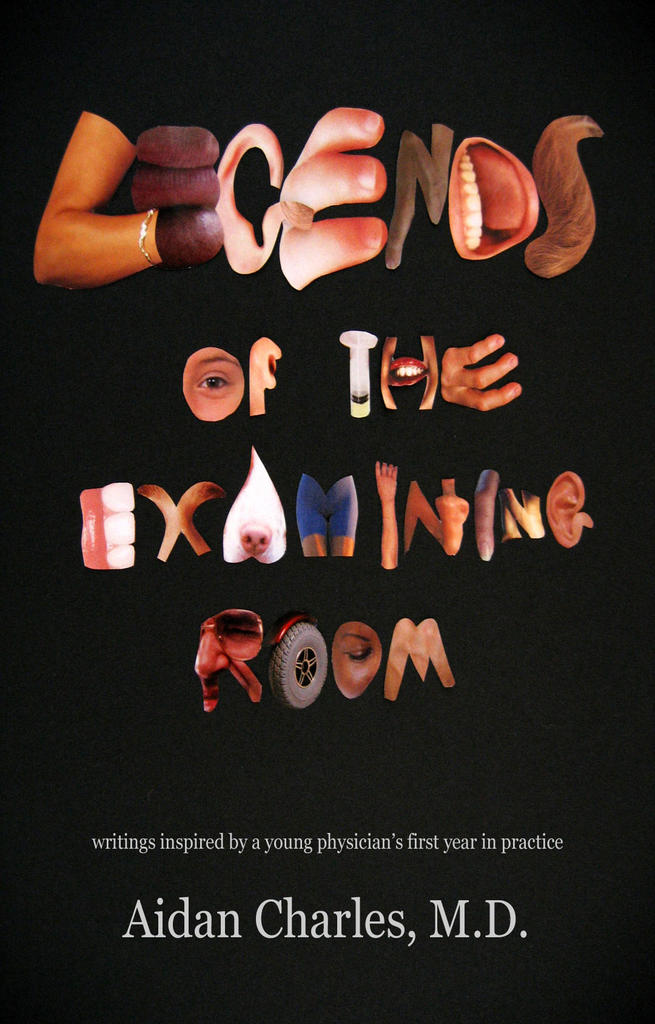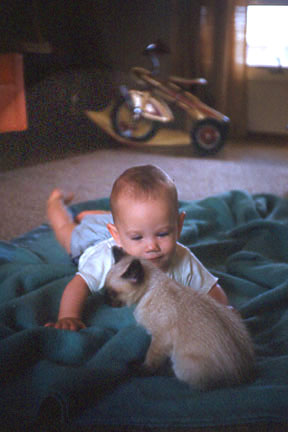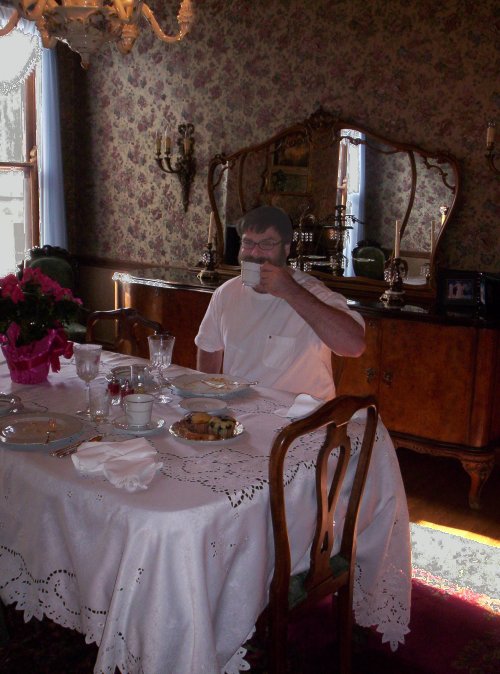Grand Rounds #L, or 50, is finally here. For newcomers, a
little
explanation is in order. Grand Rounds is a creaky old
tradition
that doctors have. Once a week, they get together and talk
about
one "case" (which is actually a person) in agonizing detail.
Then
they try to impress each other by recalling incredibly obscure details
about related cases (people).
Actually, it is not always that bad. Sometimes it gets a
little
stuffy, but it is an important part of medical education. And
some people try to lighten things up a little, as seen in this
real example
from SUNY-Buffalo.
Grand Rounds in the Blogosphere has evolved such that it includes
things written by doctors, nurses, EMT's, scientists, and a variety of
others. Some of the posts are presentations of clinical cases
(people), others are explainers about medical science, and some are
human interest stories. We always get some commentary on
health
policy and a few other related topics. The schedule is always
posted
here,
the submission guidelines are
here,
and the Google Group for discussion about Grand Rounds is
here.
Looking at the schedule, it appears that we could use a few volunteers
to host subsequent iterations of GR. (If we don't get any, I'll be
hacking into people's blogs and spreading dancing flamingos
everywhere.)
One rule about real-life Grand Rounds is that they always must start
with a really boring introduction. Now that we've gotten that
out
of the way, here are the cases (people):
#0 The zero entry is from your host, Joseph j7uy5. In case
you were wondering, j7uy5 was derived by randomly striking the tips of
the fingers of one hand, all together, vaguely in the middle of the
keyboard. It doesn't mean anything.
My post is about the
rationale for universal health coverage in the
United States of America. Please help me accomplish my goal
of having a better-informed citizenry, by taking the time to read the
sources that I linked to in the post.
#1 Our first entry is from
Arnold
Kling, Ph.D., posting on
EconLog:
Grey-area
Medicine and Non-monetary Costs.
The economics of health care is a complex and
under-appreciated
issue. Dr. Kling does a nice job of summarizing one important
point: there are costs associated with the provision of health care
that are not direct monetary costs. This, of course, is one
of
the reasons that the health care market operates in ways that defy
traditional economic models.
#2 The second entry comes to us from the Philippines, courtesy of Mic
Agbayani, MD. Dr. Agbayani has a good idea,
proposing a
brief
code
of ethics for medbloggers.
This actually would be a good topic to discuss in the Google
Group that I linked to up above, somewhere. There already is
something called the
HONcode,
which is a set of guidelines for health-related websites. The
HONcode would not be appropriate for medbloggers, but it does have some
ideas that we might decide to add to Dr. Agbayani's proposal.
#3 This next one is a
thought
piece regarding genetics and genetic testing.
Posting on Insureblog, Henry Stern, LUTCF, discusses a study
about the relationship between intelligence and
Tay-Sachs
disease in Ashkenazim:
The study
"hypothesizes that the genetic disorders could be the unfortunate side
effects of genes that facilitate intelligence." In fact, the authors of
the study had some difficulty even getting it published in the first
place. There is a very real concern that some in the lunatic fringe
would find great joy in using the results of the study for their own
nefarious goals.
This actually is not a new topic; I remember hearing about it in Anthro
#4-somethingorother when I was a senior undergrad. (That was
in 1980; I'm glad to see that more progress has been made.)
The link to the
Economist article on the
topic is
here.
What they are talking about is the concept of a
balanced
polymorphism.

#4 Dr. Charles tries something cool in his submission,
Legends
of the Examining Room. He's published a
compilation of his best blogging and would like people to consider
buying it. In his e-mail to me, he called it "shameless
self-promotion." I assured him it is nothing of the sort.
Anything that promotes considered and informed discussion
about health topics is sorely needed in our society. Plus,
he's going to donate 25% of profits to medical relief efforts.
For now, that will be the Katrina relief effort.
#5 Back to the realm of genetics,
Hsien-Hsien
Lei, PhD, presents us with an update on one of my favorite
topics,
Genetics
of Post-Traumatic Stress Disorder. It was
Katrina that got her thinking about the subject. I'm happy to
see that Dr. Lei points out how common PTSD is, contrary to common
belief. In fact, some people do not believe that PTSD even
exists. Those people might want to take a look at one of my
earlier
posts on the subject.
I'm going to take the editorial liberty of linking to another one of
her posts, to be found on the
July
2005 Tangled Bank:
Infectious
Disease Genetics. Why? As we
are going to learn from Katrina, massive climate change brings about a
reshuffling as ecological niches. Each shuffle of the deck
brings a new opportunity for disease to spread from animal hosts to
humans. The world is going to need more scientists studying
this kind of thing. And more politicians paying attention.

#6 Longtime contributor and
former
Del Rio aficionado, Orac, displays some backbone while he serves up a
sobering treatment about vertebroplasty:
Avoiding
scientific delusions. Like a good
medblogger, he is not content with just echoing the news: he gives us a
good background on the concept of evidence-based medicine, and its
practical application; he also illustrates what kind of nonsense ensues
when medical practice is not based upon good evidence.
#7 Drunken
Lagomorph,
who has the most hilarious
"about
me" page I've ever seen, has a
cute
story about nursing in a correctional facility.
Having spent time in one myself (on the "right" side of the
bars) I can say this is probably pretty typical.
#8 Posting on the
MSSP Nexus Blog, Rita Schwab puts
up a
tribute
to those medical professionals who are helping out in Katrina's wake.
Among the heroes of New Orleans,
Biloxi, Mobile, and beyond, are the doctors, nurses, technicians, and
others who stayed behind
to face a devastating storm and its aftermath in order to provide care
and comfort to their patients. As we've watched events unfold
this
week we've come to have a new appreciation for their training,
dedication, and endurance in the face of overwhelming
obstacles.
This tribute is a nice touch, since it is mostly the looters, snipers,
news pundits, politicians, and other riffraff who have been getting the
spotlight.
We must not forget that the majority of people involved are
doing their heroic best.
#9 & #9.5 The authors have a couple of posts on the
Clinical
Cases and Images Blog, which is put up by a group at Case
Western University. One post is:
Who
Are the Medical Bloggers and Where to Find Them?
As the name suggests, the author gives suggestions on how to
find medical blogs. For one, he suggests using Technorati and
searching for the tag,
medicine.
Personally, I've started using the tag
medblogger,
which hardly anyone else uses, and which seems less likely to attract
spam posts.
ClinicalCases' second entry is this:
Calculate
Your Life Expectancy. The idea of having
people calculate their life expectancy is a clever way to point out to
people what impact their lifestyle has on their mortality.
Anything that might encourage salubrious lifestyle changes is
welcome.
#10 Kim McAllister, an ED RN, sent her first GR submission:
Backpack
Your Way Through a Disaster. The Katrina
disaster got her to thinking that, since she lives on a geological
fault line, she ought to get an emergency preparedness kit for herself.
She provides tips on where to get the necessary supplies, and
what to include.
#11 David Williams, MBA, posting on
Health Business Blog,
has some advice for
Delivering
Operational Excellence. This is a good
reminder that professionals outside of the health care area do have
something to offer. In this case, he discusses lessons
learned from the Institute for Healthcare Improvement.
#12 Medpundit presents
a
postmortem of the emergency preparedness planning and its
failures in the aftermath of Katrina. Like most autopsies,
this one is not fun, but it is necessary.
#13 & 13.5 Elisa Camahort, last week's GR host, somehow had the
stamina to submit two entries from her Worker Bees blog,
Healthy
Concerns. First, she gives a
good
example of
bureaucratic inefficiency, that takes place in an
organization that is
supposedly one of the more efficient around. She then makes
the point:
It seems so inefficient. What a waste of paper, of
stamps, of administrative effort. Multiply that by the thousands and
you begin to understand why tort reform is not the biggest part of
increases in health care costs, administrative costs and overhead are.
She's absolutely right about that, as we shall see later. Her
second entry echoes one of my own concerns, that of political influence
inside the FDA:
You
Wonder if it's Political?
This pertains to the seemingly-endless delays in the approval
of
OTC
status for emergency contraception.
I know I've posted this before, but here is the info for circumventing
the bureaucratic stonewall:
Meanwhile, women who find themselves in need of EC
can call
888-NOT-2-LATE or go to www.themorningafterpill.net.
#14
Hospital Impact submitted a post:
Recent
Deluge of coverage on physicians saying "I'm Sorry".
As most of you have seen, a lot has been written
recently on the "the power of apology" from physicians. This is an
overdue & healthy development that could make a huge impact.
It's a shame that it took data "that it pays to be honest" to get
people's attention. But hey, regardless, this is better for the
patient, better for the physician, and better for our healthcare
system. [...]
Tony reviews some of the posts my other medbloggers, as well as a book,
and some news articles. Well done.
#15 Dr. Tony (a different Tony than the one above) provides us with a
dramatic-but-true
story
of rescue (nothing to do with Katrina).
I don't think we pay our emergency services personnel
nearly enough. These folks are true heroes. Thank you.
#16 Dr. Emer happens to have been one of the first people ever to visit
Corpus Callosum (other than family and friends). He makes a
return visit with
Baking
'Human Body Parts'. One of the things I
really like about medicine is that you can
never
say "Now I've seen it all." Just when you think you couldn't
possibly be surprised by whatever comes along next, something totally
unexpected comes along. (Note: it isn't really as bad as it
sounds.)
#17 Another first-time GR participant, Ruth Schaffer, MS, submitted a
nice basic science article (we should get more of these, in my
opinion):
GRN163L:
Drug Candidate Against Lung Adenocarcinoma.
She gives us some information about why cancer cells can
divide indefinitely, and what can be done about it.
#18 Mike, posting at
Interested-Participant, brings
us all some relief with
news
of a study that fails to find a link between cell phone use and brain
cancer.
This is obviously good news in the interim before the
results of another study indicate differently, which seems to happen
with regularity.
#19 Dr. Andrew MacGinnitie, posting on
Dr. Andy,
provides us with a good basic-->applied science post:
Graft
versus Leukemia. It's all about bone
marrow transplants. He gives us some hope-inspiring news:
Oncologists are now trying to take advantage of this
graft versus tumor effect and expanding it from blood cancers to solid
tumors (that primarily arise from internal organs).
This is far from being ready for routine clinical use.
However,
in light of the progress made in transplant medicine and oncology in
the past thirty years, I suspect that we will see some significant
progress here, too.
#20
Red State Moron (obviously, he's actually quite
bright) chimes in with some
information
about VBAC: vaginal birth after a C-section. He
gives a thoughtful perspective on this controversial topic.
#21
Medmusings ponders
volunteering to help survivors of Katrina:
What's been most convincing are the firsthand
accounts of nurses at medscape's blog
Now, for some entries that I nominated myself.
# Dr. Deborah Serani has a post that outlines
psychological
reactions to disaster. She also tells us what to do
about it.
# Dr. Mark Kleiman links to
a
paper he wrote for the Congressional Research Service on the
implications of the terrorist threat for drug policy.
#Anthony Cox, at
Black Triangle, tells us about the
unfortunate
effects of a shortage of
diamorphine
in the UK. This illustrates
the enormity of the problem of opiate dependence.
# Continuing with the drug theme, Dr. Mike Lee informs us of an option
for the treatment of opiate addiction:
Suboxone.
Suboxone is a combination of buprenorphine hydrochloride and
naloxone hydrochloride. A similar drug, Subutex, has
buprenorphine without naloxone. Subutex also is used for
treatment of chronic pain. For many people, it is a better
choice that methadone etc., although it takes a bit of expertise to
prescribe it safely. Perhaps I'll expand on this topic at
some point. Until then, see the FDA
page for more information.
# Finally, I would like to introduce a group blog, put up mostly by U
of Michigan med students: The
Sparkgrass Community. Sort of like CC, they tend to
post about political issues that are of interest to medical folks.
Oh, and they seem a bit left of center. And
humanistic, too. Just what the world needs...









 A healthy relationship is not like a salt
crystal, in which the only choices are rigid bonding and total
dissolution. It's more like a carboxylic acid in a mostly
lipophilic solution, in which the proton can come and go, according to
rules that the atoms have agreed to follow.
A healthy relationship is not like a salt
crystal, in which the only choices are rigid bonding and total
dissolution. It's more like a carboxylic acid in a mostly
lipophilic solution, in which the proton can come and go, according to
rules that the atoms have agreed to follow.








 :
Joseph j7uy5
:
Joseph j7uy5